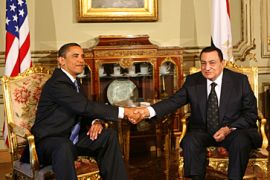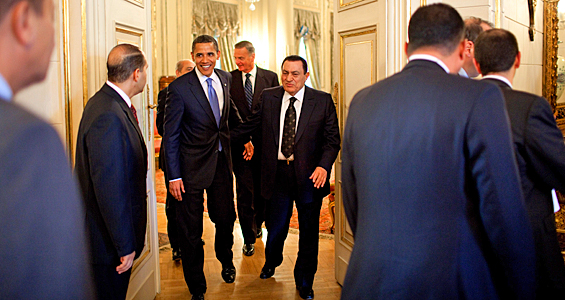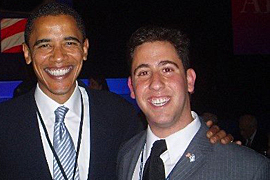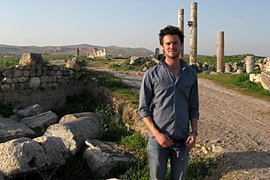Little expected from Mubarak visit
US and Egyptian youth debate the impact of Mubarak’s first US visit in five years.

 |
| Egypt under Mubarak, centre- right, has enjoyed special status in Washington [GALLO] |
Hosni Mubarak, the Egyptian president, has been visiting the US for the first time in five years, marking a thaw in relations since the Bush administration had called on Egypt to reform its political system.
Al Jazeera’s Adam Makary asked Egyptian and American youth what impact a meeting between Mubarak and Barack Obama, the US president, would have on bilateral ties and Middle East issues.
|
Stephen Robert Morse, 23, American, journalist
|
 |
| Morse: Mubarak must establish his legacy before reaching the end of his term |
At 81, it is time for Hosni Mubarak to establish his legacy.
He must win support for his National Democratic Party and more importantly, his ideology, as Egypt faces the constant threat of the more radical elements of the Muslim Brotherhood taking more control of the government.
That said, establishing a strong relationship with Barack Obama will serve the interests of moderate Egyptians who believe that allying themselves with the West will establish the nation and its leader within the Middle East bloc.
Obama’s hard-line stance on Israeli settlements and his decision to make his first address in Cairo has demonstrated his accountability as a fair leader whose eyes and ears are open to the Muslim world.
If the people in the US knew how much foreign aid Egypt received, especially during the financial crisis, they might not be too pleased.
Mubarak should be commended for making overtures to American Jewish groups during his diplomatic mission.
It will also be interesting to see how Obama reacts to a man who leads a country that lacks the transparent democracy that he supports.
Obama understands that Egypt can continue to be the strongest Muslim ally in the region, and Mubarak understands that he must continue to receive foreign aid in order to maintain his grasp on power.
|
Kholoud Khalifa, 22, Austrian-Egyptian, journalist
|
 |
| Khalifa says it has always been the same rhetoric |
If we remember Obama’s speech delivered to the Muslim world in early June, we notice that his choice in Egypt as a country was a careful and deliberate selection to serve US foreign policy both diplomatically and politically.
Obama’s choice to address Muslims around the world from a country run by a dictator has not only shown us that he is hypocritical when promoting democracy, but even worse – he has given Mubarak both the assurance and the green light to continue ruling.
All the speculations made for his visit, to resolve the Arab-Israeli conflict, strengthen ties with the US, demand a nuclear-free Middle East, have been nothing but political tumult.
Mubarak has always been an opportunist and this trip is no different than the rest.
That is not to say the aforementioned issues won’t be addressed, indeed, they will; but typically both parties will walk away with no resolutions and the same old rhetoric.
What I see happening is an attempt from Mubarak to strengthen ties between Egypt and the US, but not for national interests – rather for his own well-being.
Knowing that he doesn’t have much longer to live, he wants to indirectly introduce his son, Gamal Mubarak, as the new president of Egypt so as to make his transition to power as smooth as possible.
|
Mostafa el-Hoshy, 24, Egyptian, business analyst
|
 |
| Hoshy: Each country looks out for their own interests |
Despite tensions aroused by the Iraq War during the Bush administration, each country knows the other’s importance to its domestic and foreign agendas: Egypt is dependent on US support for the maintenance of regime power and the US needs Egypt as a stabilising force in the region.
This understanding underscores the basic relationship between the two nations, and as such, points to a preservation of the status quo by both parties given that their agendas do not stray from their current path.
Undoubtedly, Obama would ask Mubarak to limit the Muslim Brotherhood’s reach while maintaining a semblance of free speech and democracy and continued opposition to rogue regional players such as Hamas and Hezbollah.
Simultaneously, Mubarak would voice his concerns regarding US aid and lasting support on Nile water issues.
While I am not too hopeful of any significant change being brought about from this meeting, be it with regard to Egyptian governance or US imperialism in the region, it is better than having a leader (like so many in the region) with tumultuous US relations, brazenly threatening the livelihood of his people based on the whims of his regime.
The Egyptian people and the US government all appreciate the benefit of their current relationship and will work to ensure that nothing threatens it through the timeless art of appeasing each other, yet simultaneously advancing their own agendas within that framework.
|
Jessica Sarstedt, 24, American, graduate student living in Egypt
|
 |
| Sarstedt says that Mubarak’s visit to the US is a positive step forward |
Mubarak’s visit to the US must be viewed as a gesture to move country-to-country relations in a positive, more symbiotic direction.
It is no surprise that US policies enacted during the former administration harmed the relations between these two allies, but since Obama’s inauguration, it is quite evident that both countries are excited to renew long-standing relations.
In just over 200 days in which Obama took office, both presidents will have met three separate times, signalling the US desire to work closely with the Egyptian government to help solve crises that not only effect the Middle East, but the greater world.
To me, it seems that the Israeli-Palestinian issue will be on the top of the agenda for both leaders. During Obama’s campaign and presidency, he repeatedly recognised the magnitude of the crisis, and the need to take active steps toward peace.
This was remarkably different from the Bush era which seemingly disengaged from playing a part in the Israeli-Palestinian peace process.
Now for the first time in years, it seems that the US has begun to recognise this fact. Although the Obama administration has done very little on the ground to initiate the peace process, the fact that both Egypt and the US have engaged so closely in such a short amount of time signals perhaps a strategy of peace in the making.
I also believe that other issues such as Iraq, the horn of Africa, Sudan and perhaps aid money will be on the agenda during President’s Mubarak’s visit, but I believe it will be the Israeli-Palestinian conflict that take precedent.
|
Arwa Ibrahim, 21, Egyptian, graduate of the American University in Cairo
|
Mubarak’s visit is definitely a step forward in terms of the diplomatic relations between Egypt and the US.
When we come to look the real effect this visit will have on the major issues at hand however, it does not seem that a lot will come of it. Middle East peace has always been discussed among the tripartite of Egypt, the US and Israel, but until today there has been little real progress on resolving the problem.
I do not see that this visit will cause any great change to this trend.
On a diplomatic level, Mubarak’s visit to Washington has a great significance and puts out a hand for cordial relations between the two countries, which is something Egypt has always been keen on doing.
When it comes to actual changes in the issues that will be discussed, I doubt there will be any real development in them. We measure that on Obama’s visit to Egypt which was of equal significance on a diplomatic level, but as we have seen, little real change has come of it.
|
Frederick Deknatel, 24, American, freelance journalist
|
 |
| Deknatel: Mubarak is trying to assert himself as his country’s influence in the region wanes |
Mubarak goes to Washington but how much has really changed in US-Egyptian relations?
Egypt is still a central and strategic ally in the region. It still receives more American [military] aid than any Middle Eastern country that is not Israel.
It was all of these things under [US president George] Bush, too, as it has been for decades.
Mubarak’s refusal to go to Washington because of the US invasion of Iraq was just cosmetic, with little effect on US policy of trying to cultivate “moderate” or obedient partner states in the region.
In the realpolitik of his administration, a likely passover of power to the son Gamal Mubarak might be fine, as long as it didn’t affect the possibilities of a comprehensive peace in the region and the status quo of American Middle East policy.
Mubarak will cover his bases, try to convince Washington to pressure Israel and not the Arab states on peace-making gestures, and of course speak to prominent Jewish-American groups on why peace between Israel and the Arabs is possible with Egypt at the helm.
|
Jordan Sousa, 28, Bermudan-American, financial consultant
|
 |
| Sousa: Egypt-US tensions soured over Cairo’s emergency laws, not the Iraq war |
I think it is important to state that I do not think anyone saw the latest Bush presidency as an era of American enlightenment.
That said, what little information was published in the American media regarding relations with Egypt, has differed from the Mubarak administration’s statements.
For example, it is still the widespread belief here that relations soured over US interference in a $50 million dollar aid package to Egypt and changes to Egyptian emergency laws that the US considered to infringe upon the modern definition of democracy and human rights, rather than the Iraq war as the Mubarak administration has claimed. I am sure that there are many reasons, all correct.
I doubt that relations between the average American and the average Egyptian depend on what their leaders say, but we do leave it up to them to provide the official position.
What benefit comes from the meeting will be largely dependent on Mubarak himself, if not prevailing Middle Eastern attitudes. The US has stayed largely consistent with respect to Middle Eastern affairs for decades, and I do not see any major policy changes looming.
I doubt that Obama and Mubarak will jointly resolve the seemingly never-ending Israeli and Palestinian conflict, or other bilateral regional issues despite any discussions they may have.